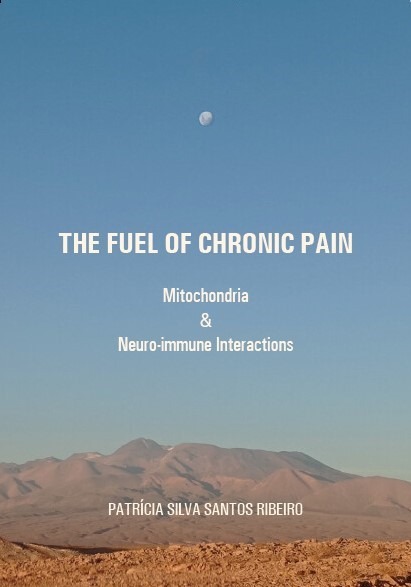Inflammation-induced mitochondrial and metabolic disturbances in sensory neurons may result in failing pain resolution. Targeting specific elements such as the redox balance or certain mitochondrial proteins in sensory neurons restored pain resolution and prevented chronic pain. These findings from the PhD research by Patricia Ribeiro (UMC Utrecht) may guide further research into new drug targets for treatment of chronic pain.
Pain is an important warning signal that normally disappears when the stimuli that caused it disappear. However, pain often persists for months or even years after the original trigger has disappeared. This chronic pain is debilitating and affects approximately 20 percent of the world population. Chronic inflammatory disease and bone pain are common causes of chronic pain and affect millions of people worldwide. These types of pain are caused by diseases such as osteoarthritis, rheumatoid arthritis and bone cancer. Existing therapies are often not effective in treating such forms of chronic pain, and some may cause severe side effects. Recent evidence shows that immune cells and neuronal mitochondrial disturbances play an important role in chronic pain. Nevertheless, there is still an incomplete understanding of how these aspects contribute to the development of chronic inflammatory and bone pain. Therefore, in this thesis, Patrícia Silva Santos Ribeiro, MSc (Center for Translational Immunology, UMC Utrecht) and colleagues examined – as part of the Horizon 2020-sponsored public-private BonepainII network – in pre-clinical studies the role of mitochondrial regulation and neuroimmune interactions in chronic pain.
Patrícia Ribeiro showed that inflammation-induced disturbances of mitochondria and cell metabolism in sensory neurons predispose to failing pain resolution pathways. Moreover, targeting specific elements of these disturbances such as the redox balance and the mitochondrial protein ATPSc-KMT in sensory neurons were sufficient to restore resolution of inflammatory pain and prevent chronic pain. The investigators identified that increased oxidative stress associated with a disturbed redox balance results in activation of the NLRP3 inflammasome pathway in sensory neurons. Inhibiting this pathway not only prevented the transition from acute to chronic inflammatory pain, but also reduced osteoarthritis pain. Interestingly, in male mice with osteoarthritis pain, NLPR3 inflammasome inhibition had longer-lasting analgesic effects than in females. Moreover, NLPR3 inflammasome inhibition decreased the population of inflammatory macrophages in the dorsal root ganglia (DRG) only in males. These data indicate that, in the context of osteoarthritis pain, there is a sexual dimorphism in neuronal NLRP3 inflammasome activation and its downstream effect on immune cells, as well as sex-differences in the analgesic response prompted by inhibiting the NLRP3 inflammasome. Furthermore, the data also highlights the importance of neuro-immune interactions in chronic pain.
Patrícia’s research further added to the evidence that the immune system plays a key role in pain regulation, by showing that macrophages contribute to the development of cancer bone pain, another type of bone pain which etiology is not fully understood. However, in contrast to osteoarthritis pain, DRG and spinal cord macrophages do not seem to contribute to the maintenance of cancer bone pain. Future research has to identify in which tissues these macrophages contribute to bone cancer pain. Finally, the investigators showed that the inhibitory immune receptor LAIR-1 is required to resolve from inflammatory pain, likely through T cell mediated regulation.
Patrícia Ribeiro summarized: “Overall, the studies described in my thesis unveil how mitochondrial dysregulation and neuro-immune interactions contribute to chronic pain development. In addition, in collaboration with Prof. Linde Meyaard, PhD and Michiel van der Vlist, PhD, we identified a previously unknown role for LAIR-1 in the regulation of inflammatory pain. Our findings may guide further research into new drug targets for treatment of chronic pain.”
Patrícia Silva Santos Ribeiro, MSc (1996, Aveiro, Portugal) defended her PhD thesis on November 26, 2024 at Utrecht University. The title of her thesis was “The fuel of chronic pain – Mitochondria & Neuro-immune Interactions”. Supervisor was prof. Niels Eijkelkamp, PhD and co-supervisor was Hanneke Willemen, PhD (both Center for Translational Immunology, UMC Utrecht). In 2024, Patrícia Ribeiro started as a postdoc at Erasmus MC in Rotterdam to study hematopoietic stem cell niches in leukemia.

